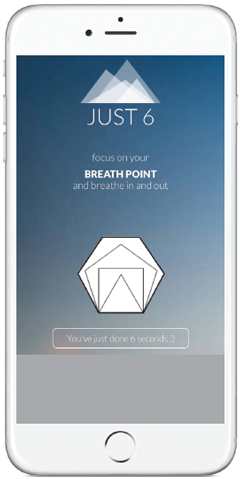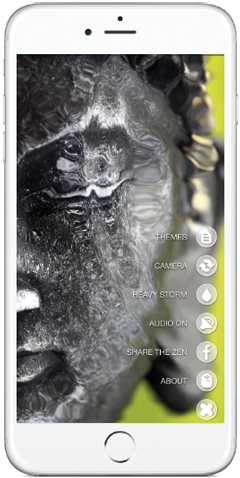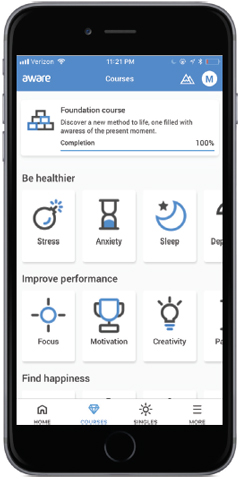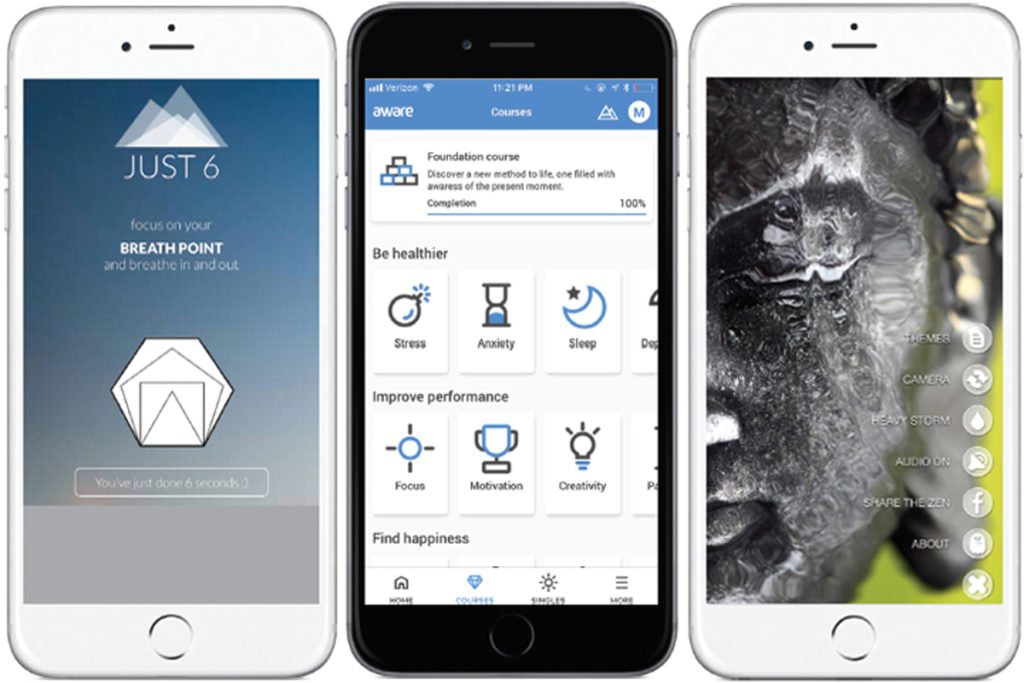The three apps reviewed here offer a range of mindfulness experiences, from simple breath awareness to a soothing—if not formally meditative—screen-based game to thorough courses on meditation practice. The web-based app Just 6 provides a platform for counting your breath for just six seconds via an expanding and contracting graphic; ZenView turns your phone into a reflecting pool of images that you can muddle using various ripple and rain effects or by trailing your finger across the screen; Aware offers three-week courses with traditional long-term practice goals and shorter sessions focusing on day-to-day activities and feelings.
Read our entire archive of meditation app reviews here.

JUST 6 (FREE)
Designed by Just Being, a company dedicated to developing emotional intelligence through mindfulness meditation, Just 6 is founded on the maxim “Just six seconds of mindfulness can make you more productive, focused, creative, and happy.” Though the app is web-based and there’s no mobile version, you can access it via your phone’s web browser. Its home page features an image of mountains superimposed with a “Begin” button. Click it and an instruction pops up: “Focus on your breath point and breathe in and out.” To help you count breaths, a triangle graphic repeatedly unfolds, origami-like, into an octagon, then refolds. After six seconds, a message appears: “You’ve just done six seconds.” If you’re not familiar with the concept of a breath point, a second button brings up a description of how to locate the spot—usually the tip of the nose—where you feel the sensation of air passing in and out of your nostrils. That’s it.
Because Just 6 is web-based, you can keep the page bookmarked—or, better yet, keep it continuously open as a tab in your browser. For some, this may make Just 6 more accessible than a mobile app—a few seconds of mindfulness are literally just a click away. Though six seconds is the shortest meditation I’ve ever seen endorsed, I found myself checking in to it whenever I was online. The tiny reset was genuinely helpful.
Web-based
just6.life

ZENVIEW (FREE; $1 FOR PREMIUM SCENES)
If you’ve ever been stuck in grim surroundings and wished for a more tranquil view, look no further than ZenView, which turns your device’s screen into a virtual pool of water with a selection of scenes—including a bamboo forest, a starry night, and a sand garden—that appear as reflections. ZenView’s developers claim that there’s “no need to practice Zen meditation for total relaxation and de-stressing” when you can “just point your camera and let ZenView do the rest.” Despite this hyperbole, playing around with the app is indeed soothing. You can experiment with leaving the reflections undisturbed, applying rain effects (from a sprinkle to a downpour), or using your finger on the touchscreen to ripple the reflection, then watch it settle satisfyingly back into stillness. Realistic watery sounds are optional, but I found that they enhanced the calming effect. You can also access your device’s camera and transform, say, a dingy subway platform—or even your own face into a reflection that you can swirl with your finger. Though the preset scenes are lovely, some verge on a screen-saver aesthetic. Playing around with your real-life view offers the most therapeutic value, as you watch the present moment melt like a Dali clock, reminding us of the Zen saying “Your mind should be like a mirror, reflecting everything but holding on to nothing.”
Available for iOS

AWARE (FREE TRIAL; $7.99/MONTH; $29.99/ YEAR; $74.99/LIFETIME)
Aware’s offerings begin with a 21-day foundational course called Being in Awareness. The rest of the content unlocks only after you have completed this course (or, as I did, fast-forwarded through the lessons to get there). Over the three weeks, Being in Awareness takes practitioners from the rhythm of the breath to watching streams of thought to embracing feelings with compassion. By the end, however, the content started to feel redundant.
The app’s subsequent three-week “courses” are focused on long-term goals: “Be healthier,” “Improve performance,” “Find happiness,” and, oddly, “For sportsmen” (not women?). You can skip around between them as needed, which is a relief (the app saves your progress), and the content is more targeted and much less repetitive than the foundational course.
I found the real draw of the app, though, to be its brief sessions. “Energizers” are quick awareness exercises, including a sound immersion and body scan. “Singles” are one-off meditations for common daily activities and feelings, including work breaks, quitting smoking, and anxiety; you select the length. “Travel,” for example, includes a meditation on your fellow travelers and the sensations of movement, but “Cooking” is more focused on planning a balanced meal than on calming the mind (it even advises you to pause the meditation to jot down a shopping list!). Aware’s only unguided, silent meditation is buried in this “Singles” section.
An unusual feature is the “Breathe” tab, which offers five animated breathing exercises. The pace for each exercise is accompanied by a hornlike sound and a blue arc rising and falling on the screen. Although I found the sound distracting, the animation helped focus my breathing. Aware’s interface is spare, with a cool blue-and-white scheme and graphics for each topic. All meditations are delivered in the same soothing male voice. There is also a selection of ambient sounds (fireplace, mountain lake) that can be played inside or outside the app, and an optional “personal mindfulness buddy” who answers questions and offers advice through notifications.
Available for iOS and Android
awaremeditationapp.com
Thank you for subscribing to Tricycle! As a nonprofit, we depend on readers like you to keep Buddhist teachings and practices widely available.
